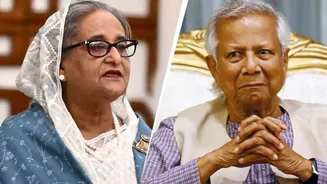Reaffirming India's Support
The relationship between India and Nepal has deep roots, marked by shared cultural heritage and geographical proximity. The recent conversation between Prime
Minister Modi and the Nepalese Prime Minister served as a reaffirmation of India's dedication to Nepal's peace initiatives. Modi's emphasis on supporting these efforts underscores the significance India places on regional stability and the well-being of its neighbors. This supportive stance indicates a continuing commitment to fostering a collaborative environment for the betterment of both nations. The call also likely covered various areas of mutual interest, including economic development and infrastructure projects, which are crucial for strengthening the bond between the two countries. India's ongoing backing highlights its strategic importance and commitment to peace efforts, underscoring a diplomatic strategy based on cooperation and mutual benefit.
Strengthening Bilateral Ties
Beyond the reaffirmation of support, the phone call provided an opportunity for discussions on enhancing bilateral ties. Such high-level communications often address specific areas where collaboration can be increased, such as trade, investment, and connectivity projects. These discussions aim to foster more robust and resilient partnerships. The dialogue would likely have included discussions on ongoing infrastructure projects that improve both countries' accessibility and trade routes. Discussions on regional stability and collaboration on various international platforms could have been part of the agenda, further solidifying the relationship and promoting cooperation on global issues. The emphasis on these areas suggests a broader strategic vision, aiming to strengthen not only the political but also the economic and social ties between India and Nepal.
Regional Cooperation Dynamics
The interactions between India and Nepal are not conducted in a vacuum; rather, they are framed by regional and international politics. India's actions are a reflection of its larger geopolitical strategy, which prioritizes relationships with its neighbors and regional stability. The support expressed by Modi for Nepal's peace efforts reflects an understanding of the complexities involved. Strengthening these relations helps to counterbalance external influences, allowing the nations to pursue their shared goals without undue interference. The dynamics within the region also involve other players, such as China, thus shaping India's approach. Through maintaining strong ties with Nepal, India can safeguard its interests while promoting peace and cooperation throughout the region.
Looking Ahead: Prospects
The phone call between the leaders signals a forward-looking approach. The future of India-Nepal relations seems to be bright, with ongoing efforts to deepen cooperation in various sectors. The continued support of India for peace initiatives in Nepal can have a significant impact. It will likely promote stability and prosperity in both countries. The leaders probably discussed potential areas for future collaborations, including projects related to sustainable development and climate change. Such strategic initiatives can have a positive effect on the economies and societies of both nations. The strengthened bond should benefit from collaborative efforts, paving the way for a more integrated and mutually beneficial future. The focus on shared objectives indicates that the relationship between India and Nepal is set to grow and evolve in years to come.














